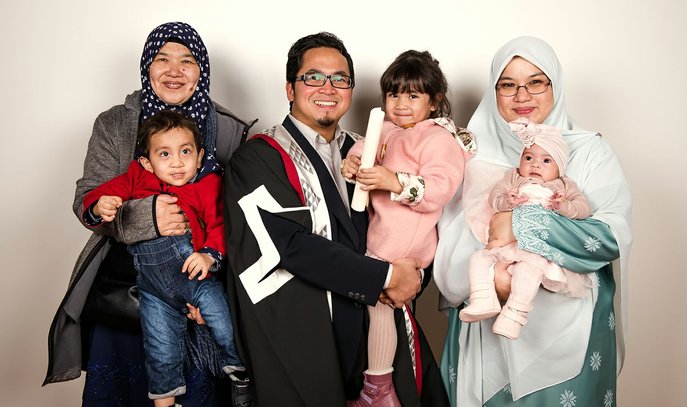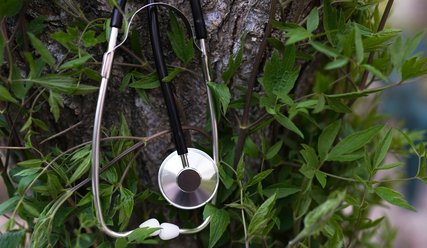Meet the GPEP family
Husband and wife Musab Hassan and Natasha Ismail got more than they bargained for when Musab entered the GPEP programme in 2014.
“During our GPEP induction meeting to the programme I noticed three or four of the registrars were pregnant. Natasha and I were married in 2011 and had been trying to start a family since then. Someone joked that if nothing else worked, GPEP would do the trick,” Musab laughed.
And it did. A recent Facebook post from Natasha showed off their gorgeous, young family.
We recently caught up with Musab, who is now a College Fellow practicing at Upper Hutt medical centre, to hear he and Natasha’s story.
During our chat Musab spoke about how surprised the pair were when she finally fell pregnant during his training, after what Natasha refers to as “thousands of dollars in treatments, cycles upon cycles of becoming a monster, and one too many ovarian hyperstimulation episodes.

The happily married couple jokingly refer to the new additions to the family as ‘GPEP Baby 1’, ‘GPEP Baby 2’ and ‘Fellowship Baby’. All jokes aside, their son Adha (pictured right) is now two years old, daughter Amal (left) is three, and their new-born daughter Awfa was born in July this year.
A family man, Musab says having enough flexibility in his career to spend quality time with his loved ones was always important. That was one of the things that attracted him to becoming a general practitioner. After spending three years working in few different hospitals and trying his hand at everything from psychiatry to surgery, he realised general practice ticked all the boxes.
“It’s [general practice] very family-oriented. It allows you the flexibility to do things other than work – I get to spend time with my family which is great,” Musab says.
“And contrary to belief, you don’t have to sacrifice specialising – you can choose a specific speciality or sub-speciality and become an expert in that area.
Musab tells us that it’s not just the flexibility and variety of the job that he loves, but the fact that he gets to build genuine relationships with his patients. In particular, he gets real satisfaction out of working with young families. Having had his own personal experiences as a young father and husband, he feels he can relate to his patients’ own journey, and they to his.
“Getting to know the patients… having a young family myself, helping patients in a similar situation is very rewarding. I’ve had a few families who I’ve been with through each stage of their family planning – from the first moment they decide they want to have children, to the moment they become parents, and beyond. It’s more than just a doctor-patient relationship. You’re building trust with them and they with you, and you’re given a window into a very special moment in their lives,” he says.
As much as he says his career is hugely rewarding, as with any profession, there are some real challenges. In particular, Musab says he’s noticed an increase in demand from patients with questions from “Dr. Google”. While it’s great to see patients engaged with their own health care, from a GP’s perspective, Musab says it’s not always possible to address all their concerns during one 15-minute consultation, and it can be a delicate balancing act.

“During our GPEP induction meeting to the programme I noticed three or four of the registrars were pregnant. Natasha and I were married in 2011 and had been trying to start a family since then. Someone joked that if nothing else worked, GPEP would do the trick,” Musab laughed.”
In this vein, Musab opines that new technologies in general are proving to be a bit of a double-edged sword for general practitioners. New offerings such as e-consults, where GP consultations are done through either video or text, for example, have really challenged the traditional doctor-patient relationship. At the same time, though, he says he recognises the benefit these types of technologies may offer general practice, especially against the backdrop of increasing workloads and the GP shortage.
“With these new technologies, there’s definitely a pressure for general practices to jump on board… but it’s a tricky one. I’m all for embracing new technologies, I think there just needs to be checks and balances put in place to maintain the key features of the traditional general practice model.”
For Musab, it’s important to him that he maintains continuity of care with his patients, and part of that is being able to see them face-to-face, for everyday issues like colds and immunisations. He tells us that even though it can be a challenge to manage all of these concerns alongside more complicated health issues, the simpler health concerns help GPs remain skilled across a wide range of issues – that is, to remain generalists – and GPs don’t want to lose their ability to do that.
As someone who has successfully completed GPEP and come out the other side – not only as a Fellow and a highly skilled practitioner – but also as a father of three healthy children, we asked Musab to shed some light on his experiences of the programme and his advice for young registrars.
“Getting to know the patients… having a young family myself, helping patients in a similar situation is very rewarding. I’ve had a few families who I’ve been with through each stage of their family planning – from the first moment they decide they want to have children, to the moment they become parents, and beyond. It’s more than just a doctor-patient relationship. You’re building trust with them and they with you, and you’re given a window into a very special moment in their lives,””
“I would encourage trainees to roll with the punches. Accept that you’ll make mistakes along the way – make mistakes and learn from them. Make use of your peers and teachers and enjoy your first year when there’s no pressure; it’s all about observing and learning about what it is to be a GP.”
When we asked him about the highlights of the programme, he was enthusiastic about how well-supported registrars are, especially in the first year.
“It’s a really collegial programme and very supportive – you’ll get to see your peers every week, and that’s really useful when you’re learning the ropes,” he says.
“The same goes for GPEP 2/3 – there’s still an expectation that you’re learning, and you can go at your own pace. It’s really family oriented too, and very flexible.”
Related

11 September 2025 | College and members
GPs want patients to be seen, heard and known

21 May 2025 | College and members
Budget 2025 opinion: We don't need to create a new health service, we need to invest in the current one

26 March 2025 | College and members